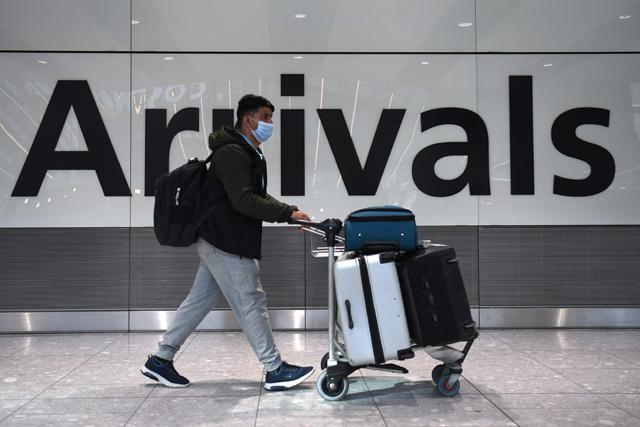- International News
- Tue-2021-02-16 | 03:44 pm

Britain on Monday began mandatory hotel quarantine for arrivals from high-risk countries as New Zealand identified its first cases of the UK strain from the outbreak that forced its largest city into lockdown.
Peru's foreign minister, meanwhile, became the latest senior figure to resign in a growing scandal over top officials jumping the queue for vaccinations.
And Zimbabwe got its first batch of China's Sinopharm vaccine, the first country in southern Africa to receive it.
British officials introduced mandatory hotel quarantine rules for arrivals from dozens of countries deemed "high risk" for coronavirus variants, in a bid to stop new strains spreading.
All UK citizens and permanent residents entering England from 33 countries on a wider travel ban list must self-isolate at their own expense in approved hotels for 10 days and take several COVID-19 tests.
Arriving travellers caught lying about being in one of those countries 10 days before their journey could receive up to 10 years in prison — a penalty already criticised as excessive.
"It can't be easy for them to be in a bedroom for 10 days," Charlie Islam-Harry, manager of the St Giles Heathrow hotel, told AFP. Her staff will carry out regular welfare checks on guests during their enforced stays, she promised.
Two coronavirus infections that prompted a snap lockdown of Auckland in New Zealand's were caused by the more contagious variant first detected in the UK, the country's health ministry said Monday.
They had no link to any other positive cases detected so far in New Zealand.
"This result reinforces the decision to take swift and robust action around the latest cases to detect and stamp out the possibility of any further transmission,” the ministry said.
Prime Minister Jacinda Ardern ordered the three-day lockdown for almost two million Auckland residents from Monday, closing schools and non-essential businesses.
While health officials have detected no new cases beyond the initial cluster of three in one family, they are still trying to determine how the virus entered the largely COVID-free country.
Ardern has been widely praised for her management of the pandemic, with New Zealand recording fewer than 2,000 infections.
In Peru’s vaccination scandal, Foreign Minister Elizabeth Astete resigned on Sunday, acknowledging in a statement that getting vaccinated last month had been a "serious mistake”.
She became the second ministerial casualty after Health Minister Pilar Mazzetti stepped down last week following a newspaper report that former president Martin Vizcarra had received a shot of the Chinese Sinopharm vaccine in October.
Peruvian media said that Attorney General Zoraida Avalos had opened a "preliminary investigation” against ex-president Martin Vizcarra and others responsible for the early vaccination of senior officials.
"It is not possible that in the midst of a crisis public office is used for personal gain,” Peruvian Congress speaker Mirtha Vasquez told America TV.
Public resentment is growing over officials getting the jabs when there is no date for a wider immunisation drive.
The south American nation has been badly hit by the pandemic, with its hospitals overwhelmed and a targeted vaccination program for health workers kicking off only a week ago.
Peru has received 300,000 doses of the Sinopharm vaccine.
Vietnam sets curbs in north
The novel coronavirus has killed at least 2,400,543 people since the outbreak emerged in China in December 2019, according to a tally from official sources compiled by AFP as of 1200 GMT on Monday.
Nearly 172 million vaccine doses have been given in at least 96 countries or territories, according to an AFP tally drawn from official sources.
But most of those doses have gone to the richer countries.
A shipment of 200,000 doses of China’s Sinopharm vaccine arrived Monday in Zimbabwe — a donation from the Beijing government.
"It has not been lost on us that in times of need, China’s response has been swift,” said Vice President Constantino Chiwenga at Robert Mugabe International Airport.
Vietnam meanwhile announced 15 days of restrictions in the north of the country, the epicentre of a growing outbreak, from Tuesday, affecting two million people.
Residents of Hai Duong province have been ordered to stay at home, state media reported.
Gatherings of more than two people will be banned, while schools, bars, restaurants and karaoke parlours that were shut early ahead of the Lunar New Year holiday will stay closed.
Vietnam has been widely praised for its handling of the pandemic so far.
Italy’s government meanwhile banned ski resorts from opening, citing coronavirus concerns — just a day before skiing was to have been allowed for the first time this winter.
In Geneva, World Health Organisation experts are meeting Monday to evaluate granting emergency approval to the Oxford-AstraZeneca vaccine so it can be shipped to poorer nations.













